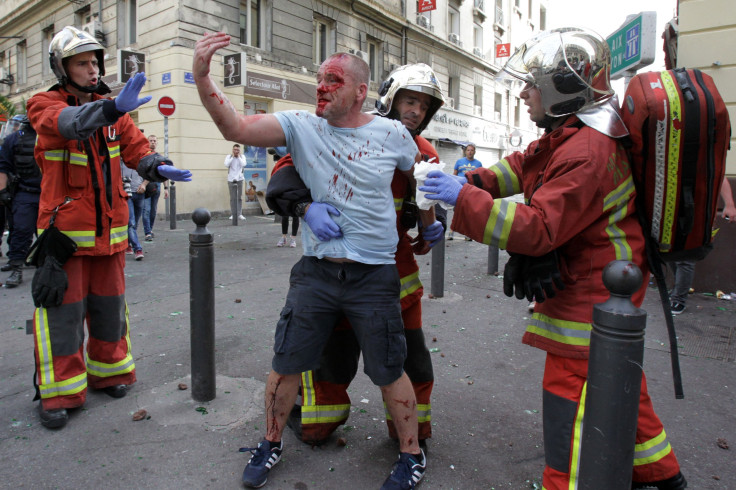Euro 2016: Russian Hooligans Lead Mass Street Violence In France

Euro 2016 was supposed to decide the best soccer team on the continent. Instead, organized, well-trained and professional bands of Russian hooligans have taken over the streets of France to claim the title as the world’s best purveyors of soccer violence.
Perhaps even more frightening, some Russian officials are publicly defending the mob actions, and the violence has continued with no end in sight.
Beginning Friday in the early morning hours before Russia opened the tournament against England, whose supporters begot hooliganism in the 1970s and have long been associated with violent flash mobs, 150 Russians attacked English supporters in Marseille’s streets; the violence continued inside Stade Velodrome during and after the two teams reached a 1-1 result.
Following the chaos, UEFA fined Russia’s national team 150,000 euros (about $170,000) and threatened it with disqualification if the violence occurred “inside the stadium at any of the remaining matches of the Russian team during the tournament.”
The carefully worded statement has done nothing to deter Russian hooligans, who are evidently focusing their “hyperviolent” energy in public streets away from their team’s matches.
The violence continued and hasn’t stopped over the subsequent days, as the hooligans made their way north to Lille, at the other end of France, for Russia’s match against Slovakia on Wednesday. Slovakia prevailed 2-1 in the match, during which a flare was lit by a fan in Russia's end of the stadium behind the goal, and the loss could only worsen the violence.
According to Daily Mail, Russians attacked England and Wales supporters who were chanting, “We hate Russia.” Melees ensued in Lille’s Grand Place, where several bars are located, and police reportedly detained two Russian supporters and arrested four hooligans who were carrying weapons.
Also on Wednesday, French police arrested 43 Russian fans who were aboard a bus in the Alpes-Maritimes region and suspected of participating in the violence.
In response to the detentions and UEFA’s threat of disqualification, Russia’s Foreign Ministry said it had called on France’s ambassador to answer for what it perceives as “discriminatory” and “nonselective" treatment of those arrested.
“It was pointed out that a further injection of anti-Russian sentiment around the theme of the participation of our team in the European Cup can significantly burden the atmosphere of Russian-French relations,” the statement concluded.
Hooliganism has plagued soccer in Europe for decades, but Russia’s latest batch of perpetrators are a new breed that use social media to organize fights with other hooligan groups and film their violent escapades using GoPro cameras and post them online. To join one of the groups, an aspiring member must train in the woods and reportedly fight off four or five hooligans to be initiated. The members also actually abstain from drinking to make them more alert while training in boxing and mixed martial arts.
What is more, the groups are not only organized but have specific roles within their clans. There are “ultras,” those who stand behind the goal during matches, as well as “fighters,” who use tactics like a “jump” or “action” to inflict damage. A “jump” is when a hooligan takes a few shots at his target and quickly retreats, and “action” is simply an all-out attack, a hooligan told the BBC.
Matters were only made worse when Russian Sports Minister Vitaly Mutko was seen cheering on the violence taking place inside Stade Velodrome. But Mutko later said: “It’s clear that some people didn’t come here to watch football. They’ve covered their faces and then brought shame on their country.”
While Russia actually has and enforces a strict law again hooliganism at home, Igor Lebedev, an MP of the Liberal Democratic Party, a nationalist group, who also serves on the executive committee of the Russian Football Union, actually condoned the actions on Twitter.
“I don’t see anything wrong with the fans fighting. Quite the opposite. Well done, lads, keep it up!” Lebedev posted, according to the Independent of London.
“I don’t understand those politicians and officials who are criticizing our fans. We should defend them, and then we can sort it out when they come home.
“What happened in Marseille and in other French towns is not the fault of fans, but about the inability of police to organize this kind of event properly.
“Our fans are far from the worst; it’s unclear why a lot of media are trying to say our fans’ actions were shameful. You should be objective. If there had been no provocation from English fans, it’s unlikely our fans would have got into fights in the stands.”
Lebedev’s inciting comments followed Russia’s manager Leonid Slutsky’s accusation that England’s fans started the ruckus by shouting while Russia’s national anthem played before the game. However, he also said Russia will comply with the rules.
“We have to follow the rules; I’ve already said that,” Slutsky said at a press conference Tuesday. “We do need your support, but we have to focus on the support of our team and do it in a legal framework.
“We are sure that we’re not going to be kicked out. There’s not going to be any injustice.”
© Copyright IBTimes 2024. All rights reserved.





















